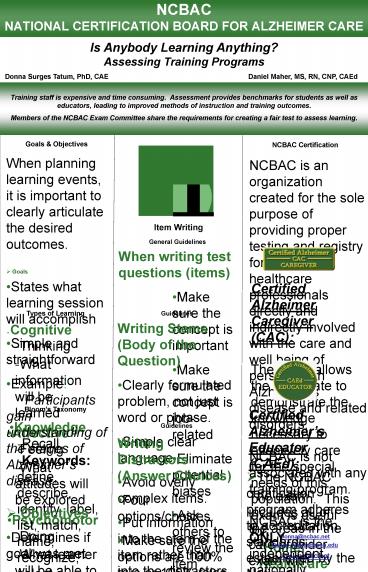NCBAC NATIONAL CERTIFICATION BOARD FOR ALZHEIMER CARE - PowerPoint PPT Presentation
1 / 1
Title:
NCBAC NATIONAL CERTIFICATION BOARD FOR ALZHEIMER CARE
Description:
NATIONAL CERTIFICATION BOARD FOR ALZHEIMER CARE. Training staff is expensive and time consuming. ... The NCBAC certification program adheres to accreditation ... – PowerPoint PPT presentation
Number of Views:168
Avg rating:3.0/5.0
Title: NCBAC NATIONAL CERTIFICATION BOARD FOR ALZHEIMER CARE
1
NCBACNATIONAL CERTIFICATION BOARD FOR
ALZHEIMER CARE
Is Anybody Learning Anything? Assessing
Training Programs Donna Surges Tatum, PhD,
CAE Daniel Maher, MS, RN, CNP, CAEd
Training staff is expensive and time
consuming. Assessment provides benchmarks for
students as well as educators, leading to
improved methods of instruction and training
outcomes. Members of the NCBAC Exam Committee
share the requirements for creating a fair test
to assess learning.
Goals Objectives
NCBAC Certification
- When planning learning events, it is important to
clearly articulate the desired outcomes. - Goals
- States what learning session will accomplish
- Simple and straightforward
- Example
- Participants gain understanding of the
stages of Alzheimers disease - Objectives
- Determines if goal was met
- Specific and measurable
- Example
- Participants design 3 ADLs for those with
moderate Alzheimers disease - Remember
- The Goal is what is to be learned.
- The Objective is how they will get there
NCBAC is an organization created for the sole
purpose of providing proper testing and registry
for those healthcare professionals directly and
indirectly involved with the care and well being
of persons with Alzheimers disease and related
disorders. NCBAC is not associated with any
training program. NCBAC is the ONLY
independent, nationally recognized board that
administers standardized certification
examinations in dementia care following the
healthcare certification/licensure model.
Item Writing
General Guidelines
- When writing test questions (items)
- Make sure the concept is important
- Make sure the concept is job-related
- Eliminate potential biases
- Ask others to review the item
- Include references
- Certified Alzheimer Caregiver (CAC)
- The exam allows the candidate to demonstrate the
knowledge necessary to effectively care for the
special needs of this population. This exam is
useful for - Home Healthcare Providers,
- Family Members
- Nurse Aides
- Caregivers
- Activity Directors
- Nurses
Types of Learning
Guidelines
- Writing Stems (Body of the Question)
- Clearly formulated problem, not just word or
phrase. - Simple clear language.
- Avoid overly complex items.
- Put information into the stem of the item rather
than into the distractors. - Pose question as a positive.
- Write questions that can be answered without
looking at the options. - Never use double negatives.
- Avoid vague terms like usually and frequently.
- Cognitive
- Thinking
- What information will be learned
- Affective
- Feeling
- What attitudes will be explored
- Psychomotor
- Doing
- What learner will be able to do
Blooms Taxonomy
- Certified Alzheimers Educator (CAEd)
- The exam includes all of the areas in the care
provider exam with additional content on adult
learning techniques. This exam is useful for - Administrators
- Trainers
- Nurses
- Social Workers
- Knowledge
- Recall
- Keywords define, describe, identify, label,
list, match, name, recognize, select - Comprehension
- Understanding
- Interpret Information
- Keywords defend, distinguish, explain, give
examples, infer, predict, summarize - Application
- Use information in concrete situations
- Analysis, Synthesis, Evaluation
- Keywords change, compare, critique, demonstrate,
discover, differentiate, justify, relate, revise,
organize, plan
Guidelines
- Writing Distractors (Answer Choices)
- Four options/choices.
- Make sure the options are 100 true or 100
false. - Avoid cueing the correct answer.
- Be sure that distractors and correct alternatives
are fairly similar in content and length. - Vary the position of the correct answer in a
random fashion throughout the test. - Use plausible logical distractors.
- Options should be grammatically consistent
- Options should be logically compatible with the
stem. - Never take phrases verbatim from the reference.
- Distractors such as none of the above or all
of the above are never used.
- The NCBAC certification program adheres to
accreditation standards established by the
National Commission for Certifying Agencies and
best practices for fair testing. - The tests are available nationally at over 200
Pearson VUE professional testing centers
Contact
Donna_at_ncbac.net Daniel_Maher_at_rush.edu www.ncbac
.net































